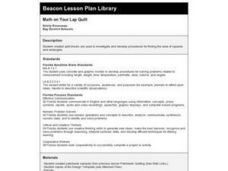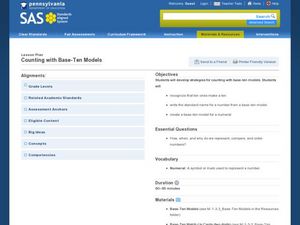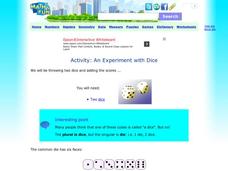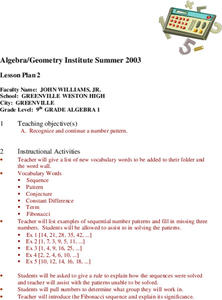Resources for Early Childhood
Making Math Meaningful and Enjoyable
Your young learners will enjoy mathematics that is meaningful correspondence as they play their way to a deep mathematical foundation. Organized around the math standards, this appropriate sequence of conceptual, preschool...
EngageNY
The Structure of Ratio Tables—Additive and Multiplicative
Build tables by understanding their structure. Scholars take a closer look at the structure of ratio tables in the 10th segment in a 29-part series. Individuals realize that the tables can be built using an additive or multiplicative...
CK-12 Foundation
Multiplying Polynomials
Help your class find patterns in polynomial multiplication. Pupils multiply a trinomial by a binomial using a graphic organizer. They respond to questions about patterns observed in polynomial multiplication before a discussion question...
Concord Consortium
Adding the Sines
It's a sign! Scholars analyze sine functions for patterns in their periods. The exploration advances beyond a simple function to the combination of two functions with even and odd coefficients. Their goal is to find a pattern between the...
Curated OER
Math On Your Lap Quilt
Get creative juices flowing when you allow groups to figure out a procedure for how to find the area of squares and rectangles. They may use the individual patchwork blocks, or they may design one using the Design Template.
DK Publishing
Learning 5 - Write the Number
Fish for fives with a cute counting worksheet! Kindergartners count schools of fish, which all add up to five, and write the correct number in provided spaces. They then copy a domino pattern at the bottom of the page. A great way to...
EngageNY
Similarity and the Angle Bisector Theorem
Identifying and verifying reproducible patterns in mathematics is an essential skill. Mathematicians identify the relationship of sides when an angle is bisected in a triangle. Once the pupils determine the relationship, they prove it to...
Maths Blog
Adding/Subtracting Whole Numbers in Your Head
Exercise those mental math muscles! This instructional activity contains 10 addition and 10 subtraction problems which require learners to compute sums or differences in their heads. A quick review at the top of the page provides a...
Curated OER
Counting with Base - Ten Models
Help your kids develop strategies for counting. In this base-ten lesson, learners use matching cards, base 10 blocks, and dry erase markers and boards to examine the base 10 counting system.
Curated OER
Activity: An Experiment with Dice
Roll the dice with this activity and teach young mathematicians about probability. Record outcomes for rolling two number cubes in order to determine what is most likely to happen. Graph the data and investigate patterns in the results,...
CK-12 Foundation
Combination Problems: Friends at a Party
Friend or stranger? Can there be less than three in a group? The interactive asks learners to prove that for seven people at a party, at least three of them are either mutual friends or mutual strangers. Pupils determine the number of...
Curated OER
Numbers in a Sequence
In this algebra instructional activity, students find the next number in the sequence and calculate the formula for the sequence. There are 23 questions.
Curated OER
Terms in a Sequence
In this terms in a sequence activity, learners solve and complete 32 various types of problems. First, they simplify each of the equations listed. Then, students find the number of arrangements found using the information given. They...
Curated OER
LET'S PARTY!
Students identify a number pattern and extend the number sequence. They make generalizations given a specific pattern and create, describe, and extend patterns. They create a table that describes a function rule for a single operation...
Curated OER
Fibonacci and the Golden Number!
In this math patterns worksheet, students review the beginning numbers in Fibonacci's numbers, find the pattern, follow directions and problem solve to find the Golden Number and complete a chart, measure lengths of body parts and find...
Teachers Network
A World of Symmetry: Math-Geometry
Define and identify the three basic forms of symmetry translation, rotation, and glides with your class. They cut out and arrange paper pattern blocks to illustrate symmetry, create a Cartesian graph, and design a rug with a symmetrical...
Curated OER
Three in a Row
In this subtraction activity, learners examine 6 grids filled with subtraction problems to determine which squares in each grid show problems with the same difference.
College Board
2012 AP® Calculus AB Free-Response Questions
What's on the test? Released items provide insight into the AP Calculus test. The six items are split into two groups, two calculator items and four non-calculator items. Resources allow teachers to see what kinds of answers test takers...
Curated OER
I See A Pattern
For this number pattern worksheet, learners find the total of 5 addition problems and tell what pattern they see. They complete 3 number patterns and create a number pattern of their own.
Curated OER
Using Tens Frames To Build Addition And Subtraction Facts To Ten
Students review the basic addition facts through ten. They use tens frames to show number patterns and number families. They also form subtraction facts to ten using dot patterns on a quinary frame. Given a number sentence they find...
Curated OER
Elves Number Patterns I
In this Christmas number patterns worksheet, students complete patterns in sequences of numbers to discover how many toys are made in 3 days.
Curated OER
Elves Number Patterns
In this number patterns worksheet, students continue patterns in number sequences to show how many toys elves will make in three days. Answers are included.
Curated OER
Patterns and Sequences
Ninth graders examine sequential number patterns and the Fibonacci sequence. Given number patterns, they determine the next number in a sequence. Students develop their own number patterns and exchange them with another to be solved.
Curated OER
Number Patterns Challenge
In this number patterns worksheet, learners practice recognizing patterns. Students determine the number pattern and complete the pattern by inserting the last two numbers. There are ten problems in all, and an answer sheet is included.

























